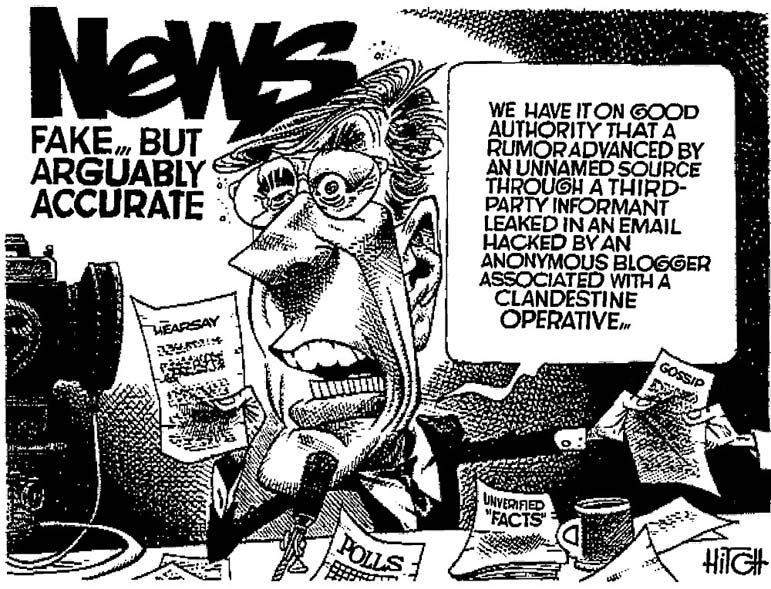
"Fake news," alas, is authentic enough. Just because the label was popularized by President Donald Trump doesn't mean it isn't sometimes real. It's a label covering a multitude of sins.
But let's also be clear: The press is not the "enemy of the people," as the president tweeted after he met in the Oval Office with A.G. Sulzberger, 37, the new publisher of The New York Times. The publisher was right to defend honorable men and women who are doing their jobs. Rigorous reporters shouldn't be lumped in with the reporters who let their opinions leach into the facts.
But when the publisher and the president met at the White House on July 20, their two perspectives seemed frozen. Marshall McLuhan's famous phrase "The medium is the message" is once more confirmed as reality, as the messages ride the electronic waves of information, misinformation and sometimes disinformation.
The media and the government are natural antagonists, an imperfect but important arrangement to keep both honest. But both suffer grievously from the slings and arrows loosed by abusive politics. It's hardly the first time a political titan has locked horns with a titan of the news.
Sulzberger's own newspaper recalls that "Tensions between The New York Times publishers and presidents are nothing new." When then-President Bill Clinton complained about the editorials for sharply criticizing his presidency, then-publisher Arthur Ochs Sulzberger Jr., the father of the new publisher, told the president he should think of the criticism as "tough love." "Well," Clinton replied, "just don't forget the love part."
Apparently, love is labor lost again in the latest president-publisher meeting. The first reports suggested a reasonable, if not necessarily warm, exchange. A few hours later, the president sent hostile tweets about "fake news" and Sulzberger said he had warned the president about using inflammatory language because it jeopardizes the lives of journalists.
The president is a bare-knuckled street fighter, and Sulzberger comes out of a family with a long tradition of taking care of the "Gray Lady," a national newspaper of record. But the speed of the electronic medium changes the battlefield terrain for both of them. They're well-matched, playing to different audiences.
A not-so funny thing has happened to communications on the World Wide Web. Nearly everyone now has to doubt much of what they see and hear. Deliberately faked news is only part of it. Social media, videos gone viral and gassy lieutenants of cable news pass along many so-called "facts" that may be mere factoids. With fewer gatekeepers, a lot of chaff comes with wheat on the internet. As the World Wide Web casts a wide net for readers and viewers, big holes are exposed where sources of "alternative facts" force their way through the unwary consciousness.
If all this is confusing to adults, we can imagine what it's doing to the young. Teenagers, who are at a vulnerable age for maturation and finding ways to filter information, find it increasingly difficult to trust those responsible to offer guidance.
Of course, teens have always had their own causes that are different from those of adults, and many are struggling like their parents to separate the fake and the authentic. Teens relying on the likes of Twitter, Reddit and Facebook find such sites busy with trolls, so many have turned to Instagram "flop" accounts, pages they collectively manage themselves. They want a dialogue that provides a fresh, factual perspective on what's happening. While flop accounts started out to critique popular culture as presented on YouTube, they've become increasingly political and polarized.
The kids see flop accounts as "more reliable and trustworthy than traditional media," writes Taylor Lorenz in the Atlantic. An increasing number of teenagers are turning to them, trusting again in their search for honest debate and research, looking to their contemporaries for help in separating opinion from fact.
"A lot of news nowadays claims to be facts, but it's based on people's opinions or they purposely omit information," says Alma, a precocious 13-year-old girl on the flop account @nonstopflops. She frets that her generation is being molded by the flaws in media culture, saying, "I wish we could trust articles more, but it's been proven multiple times of people reporting things that aren't true."
Alma's perception was echoed by the president last week when he told the Veterans of Foreign Wars, "What you're seeing and what you're reading is not what's happening." So what is? We may have to wait until Alma's generation grows up to get the answer. We must hope that Alma and her friends waste no time. We all need all the help we can get.
Comment by clicking here.


 Contact The Editor
Contact The Editor
 Articles By This Author
Articles By This Author